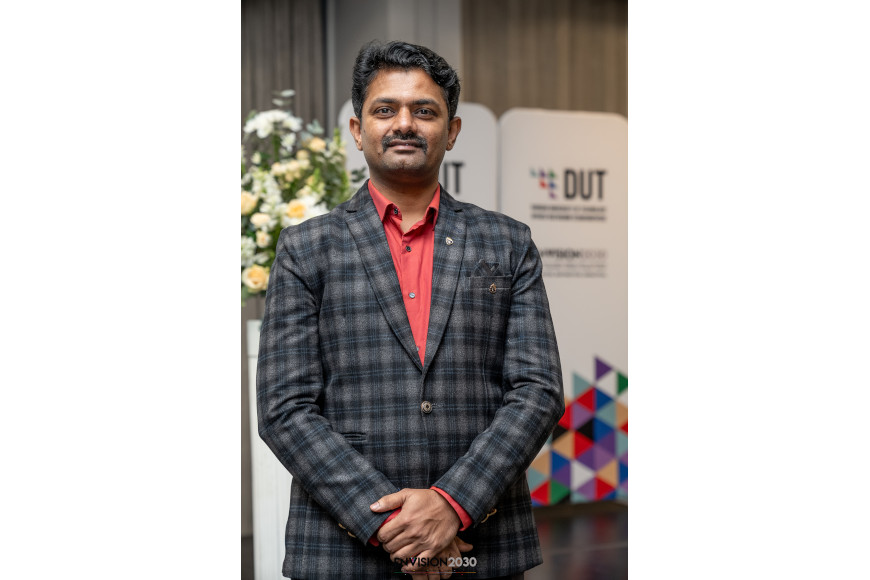Dr Prashant Bhagwat, a Grow-Your-Own-Timber (GOOT) Fellow in the Department of Biotechnology and Food Science at the Durban University of Technology (DUT) is passionate about developing efficient management systems, sustainable industrial processes, and the creation of high-value bioactive products. He believes his projects can benefit local communities through improved public health and cleaner environments, while industries can adopt cost-effective and environmentally friendly technologies.
Earlier this year, he was awarded his National Research Fund (NRF) Y2 rating after being recognised as an emerging researcher with a “commendable level of expertise and versatility.” He was commended for his dedication to producing increasingly impactful and high-calibre research across various domains over the past eight years.
“This rating highlights the rigorous methodologies and innovative approaches employed in my projects, motivating me to continue striving for excellence and making meaningful contributions to the field,” shared Dr Bhagwat.
His research focuses on biomass conversion, enzyme technology, and bioactive peptide production. Over the past five years at DUT, he has effectively contributed to the field of biomass valorisation and bioproduct formation, which resulted in publishing numerous peer-reviewed articles in DHET-accredited international journals. He is currently working on the enzymatic and microbial remediation of plastic waste and various drug molecules that act as environmental contaminants. The impact of his academic contributions is underscored by his 50+ publications, accumulating over 1600 citations.
“My research aims to enhance the market share of bio-based products by developing innovative enzyme solutions for efficient biomass utilisation. This involves the production, biochemical and biophysical characterisation of enzymes from microbial sources, and the development of enzyme-based strategies for creating functional bioactive products. My primary focus is on proteolytic enzymes capable of degrading dietary proteins, including collagen. This work seeks to convert fish waste biomass into valuable bioactive collagen peptides, along with investigating other food proteins such as milk and algal proteins for bioactive peptide formation,” explained Dr Bhagwat.
His research aligns closely with the DUT ENVISION2030 strategy by promoting sustainability, innovation, and societal impact. By focusing on sustainable biomass conversion and the development of bioactive products, his work directly supports the strategy’s goals of environmental stewardship and technological advancement. Additionally, his projects aim to produce knowledge that supports sustainable practices and policies, further aligning with DUT’s vision for a sustainable future.
“One of the most innovative aspects of my research is the development of enzyme-based strategies for selective and efficient production of bioactive products/biofuels from biomass resources. These innovations offer environmentally friendly solutions for industrial processes, reducing reliance on chemical methods. By advancing knowledge in enzyme technology and biomass conversion, my research addresses real-world challenges such as waste management and resource recovery, contributing to cleaner and more sustainable industrial practices,” added Dr Bhagwat.
Collaboration has been pivotal in advancing his research projects. Working with other researchers, institutions, and industry partners has allowed Dr Bhagwat to access diverse expertise and resources, facilitating successful project implementation. These partnerships have been crucial in translating his research findings into practical applications and enhancing the impact of his work through shared knowledge and innovation.
Some of his collaborations include, the Council for Scientific and Industrial Research (Pretoria, South Africa), Shivaji University (Maharashtra, India), Northwest A&F University (Shaanxi, China), National Institute for Communicable Diseases (Johannesburg, South Africa), Agricultural Research Council (Pretoria, South Africa), Post Graduate Institute of Post-Harvest Management (Maharashtra, India), Kazimierz Wielki University (Bydgoszcz, Poland), Chinhoyi University of Technology (Chinhoyi, Zimbabwe), Cukurova University (Adana, Turkey), Prince of Songkla University (Songkhla, Thailand), Institute of Chemical Technology, (Maharashtra, India), CSIR-Indian Institute of Toxicology Research (Lucknow, India).
His future research goals are centred around advancing sustainable technologies and innovative solutions for industrial applications. He plans to deepen his work in enzyme technology and biomass conversion, focusing on developing novel enzyme-based processes that enhance the efficiency and environmental sustainability of bioactive product production. By exploring new microbial sources and optimising enzyme functionalities, he aims to create more effective and eco-friendly bioconversion processes.
“I am committed to expanding the scope of my research to include the valorisation of a wider range of waste biomass materials, contributing to waste reduction and resource recovery. Additionally, I am leveraging advanced omics technologies to identify and characterise bioactive peptides with significant health benefits, thereby promoting public health through sustainable practices,” added Dr Bhagwat.
Moreover, he plans to actively engage in mentoring and supervising students at various academic levels, fostering the next generation of scientists who are dedicated to sustainable development and innovation. Through these efforts, he hopes to create a lasting impact on both the academic community and society at large, driving progress towards a more sustainable and innovative future.
Dr Bhagwat extended his sincere gratitude to his mentor, Professor Santhosh Pillai, Head of the Department of Biotechnology and Food Science, Prof Feroz Swalaha, the Executive Dean of the Faculty of Applied Sciences, Prof. Suren Singh, Office of the Deputy Vice-Chancellor: Research, Innovation and Engagement and the entire staff of the Department of Biotechnology and Food Science for their unwavering support which he believes has been instrumental in his achievements.
He also expressed heartfelt thanks to his family and friends for their constant encouragement. A special thanks goes to his wife, Priyanka, for her unwavering support and inspiration, which has been a driving force behind his success
Pictured: Dr Prashant Bhagwat.
Simangele Zuma

